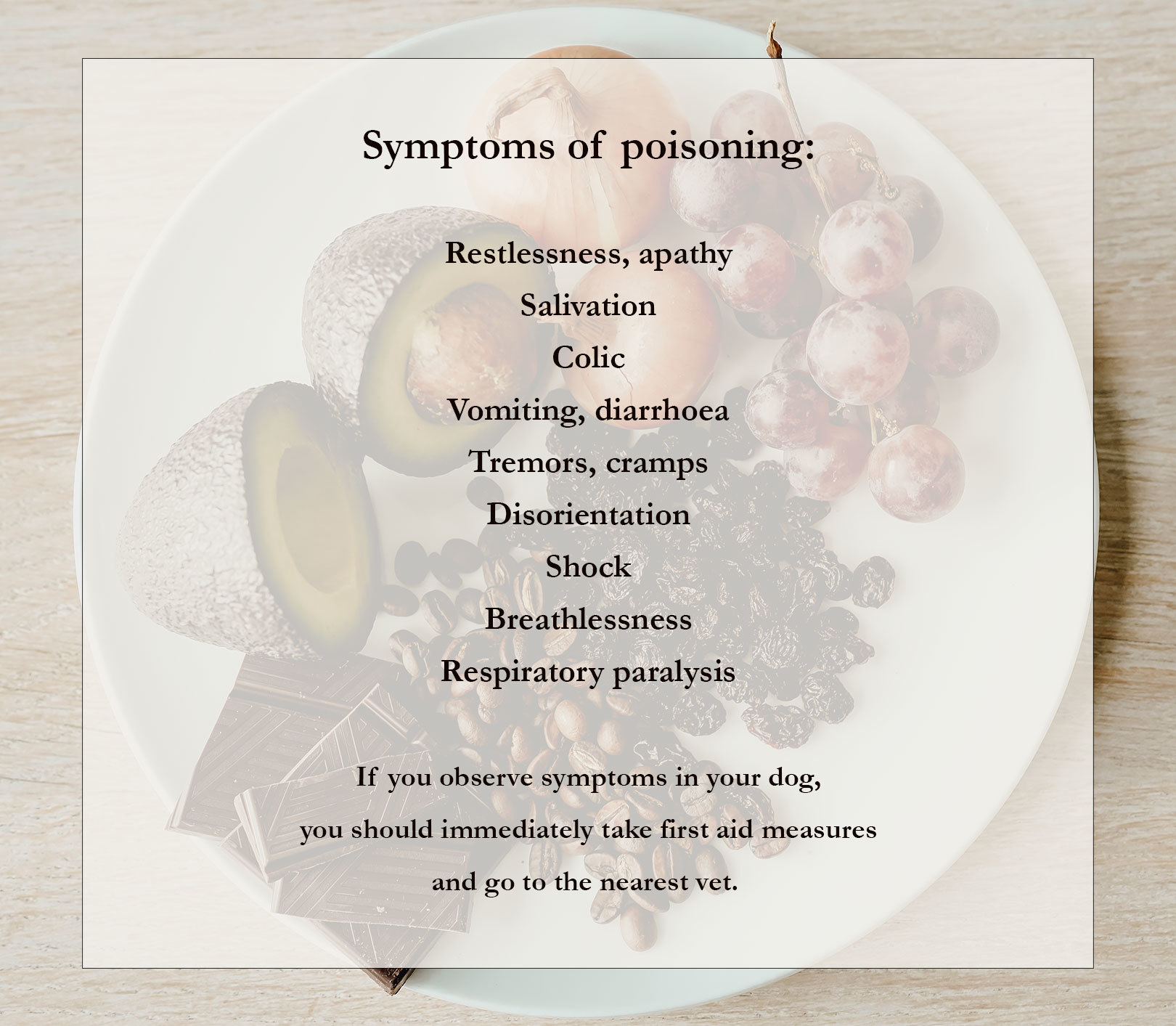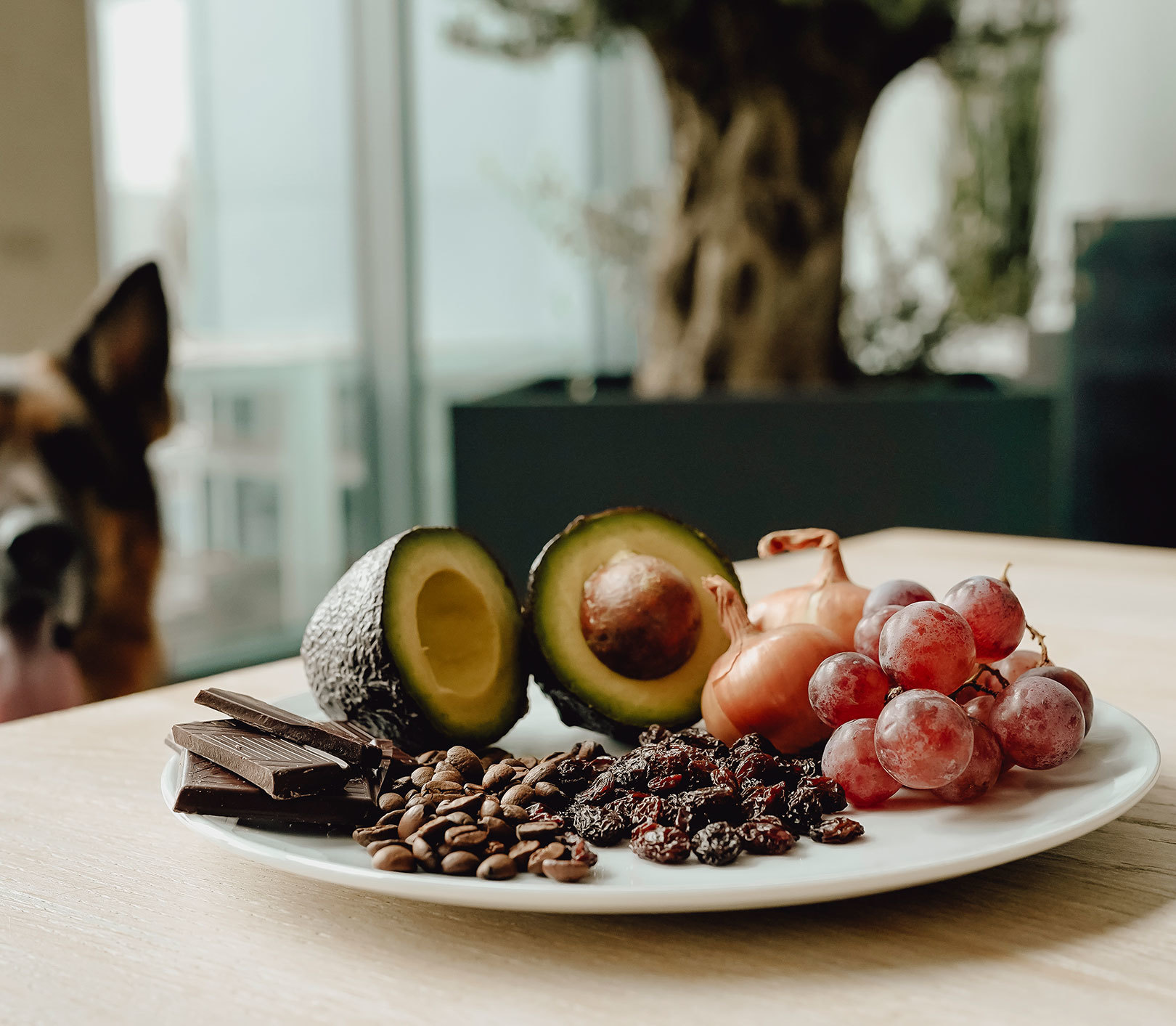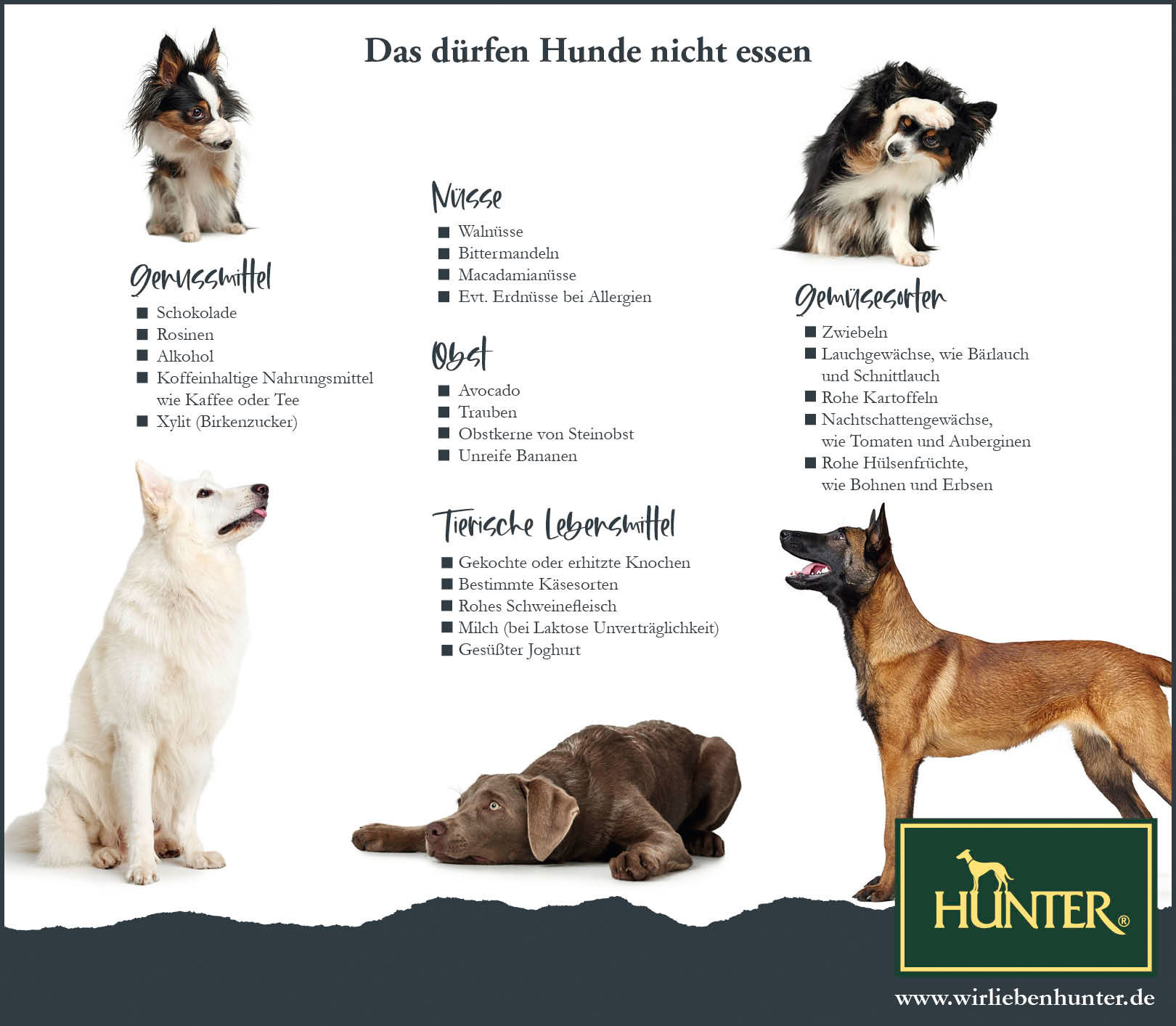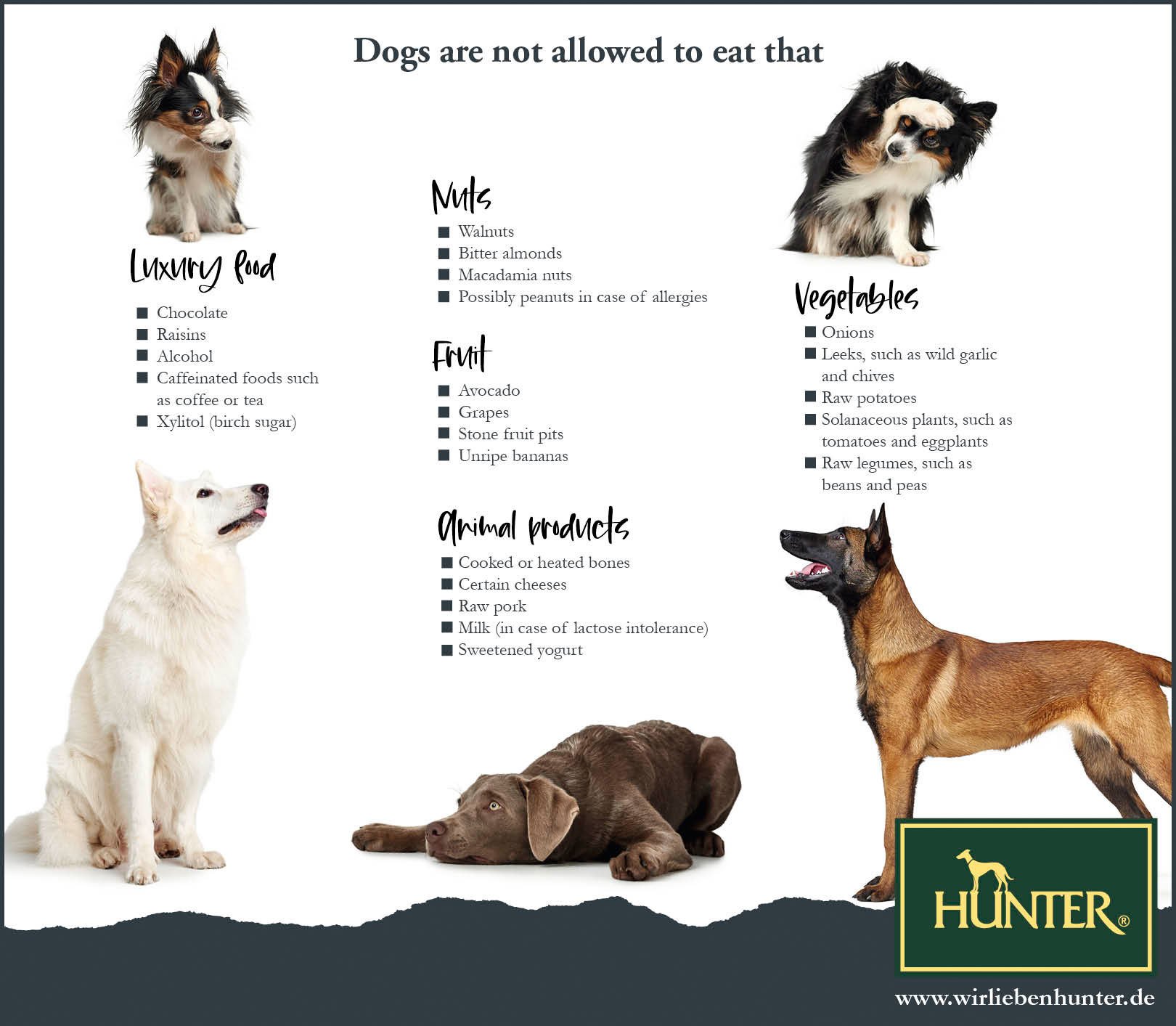What are dogs not allowed to eat?
A cup of coffee, a piece of chocolate and some grapes, followed by some dental gum: what sounds like a delicious afternoon snack for us humans can be a toxic cocktail for your dog. "Oh, that little bit won't do any harm!", you might think, when your pelt-nose wants to wrap you around her finger with her loyal puppy-dog eyes. But unfortunately it's not that simple, because every dog reacts differently: for some four-legged friends, even small amounts of certain active substances are enough to cause symptoms of poisoning. In addition to diarrhoea and vomiting as a reaction of the stomach and intestines to toxins in the body, long-term consequences such as damage to the liver or kidneys can also occur, which in the worst case can result in death.
But don't panic: Our list gives you an overview of foods that are toxic to dogs - and knowing about them is the best way to prevent them!
Can my dog eat chocolate?
No matter how much his puppy eyes might soften you: The fact that chocolate is poisonous for dogs has already become widely known. The cocoa contained in chocolate contains the substance theobromine, which is only broken down very slowly in the body and strongly stimulates the nervous system. The higher the cocoa content or the darker the chocolate, the higher the theobromine content may be.To avoid having to take your pet to the vet with a serious heart palpitation, you should
- keep chocolate out of reach
- in case of theobromine poisoning, administer charcoal tablets and consult a veterinarian directly.
Foods your dog is not allowed to eat
Besides chocolate, other foods that we humans classify as "luxury food" are not for your dog's menu. These include
- Raisins as well as grapes can lead to kidney failure
- Alcohol: has a toxic effect even in small quantities and can cause alcohol poisoning.
- Caffeinated foods, such as coffee or tea: in the worst case, caffeine can trigger cardiac arrhythmias.
- Mushrooms have no place in your pet's bowl, as their effect on the dog's organism is not sufficiently known.
- Xylitol (also known as birch sugar) is often used as a substitute for sugar: it can be found as a sweetener in numerous industrial foods, e.g. in sugar-free chewing gum, baked goods and homeopathic globules. Even in small concentrations, it can cause the dog's pancreas to release insulin and cause hypoglycaemia, which can result in liver damage or even liver failure. Even if small amounts of xylitol are ingested, a visit to the vet is essential. Hypoglycaemia must be measured using a blood test and appropriate treatment must be given.
Attention: Be careful if you want to feed your four-legged friend leftovers from your meal, because our dishes often contain strong spices and have a much too high fat content - absolutely nothing for a dog's stomach!
You should also be careful with nuts: they are very energy-rich and some types are even harmful to your dog, e.g. walnuts.
- Walnuts, which your dog should also not play with in autumn, as they may be infected with a fungus that can produce the poison Roquefortin C.
- Bitter almonds, due to the prussic acid they contain.
- Macadamia nuts, in addition to other general symptoms of poisoning, heart damage may occur.
Your dog could be allergic to the histamine contained in peanuts.
Diana from the We love HUNTER team
"From early autumn onwards, I always make sure that Lucky doesn't stay near walnut trees. He finds everything very interesting - and it can happen very quickly that he grabs a walnut. I'm not oversensitive either, but you don't have to risk anything. It's better to be a little more careful!
Vegetables to avoid
Vegetables, for example, are an integral part of your dog's food plan and part of a balanced nutrition for your four-legged friend. However, these types of vegetables are not suitable for your dog:
- onions, as the active substances contained in them damage the dog's red blood cells, which can result in anaemia.
- leeks such as garlic, wild garlic and chives can have a similar effect
- raw potatoes, as they contain solanine, which can cause cramps and vomiting
- other solanaceous plants such as tomatoes or eggplants are also taboo for your dog when raw.
- raw legumes such as beans or peas contain phasin, a substance that can cause vomiting and cramps.
Good to know: It is worth mentioning that garlic is often sold as a worm and tick prophylactic in food supplements. The effect of this has not been scientifically proven. In the case of overdoses, symptoms of poisoning can also occur here, which may also lead to anaemia if ingested over a longer period of time.
Tip: Take a look at our article "Poisonous plants for dogs" - there you will find a list of plants and houseplants that you as a dog owner should avoid with your pet.
Fruit to avoid
It is also worth taking a closer look at fruits - you should not feed your dog the following fruits:
- avocado, the superfood for humans, are not only very fatty, but also contain persine, which can damage your four-legged friend's heart. The leaves, seeds and bark of an avocado plant are particularly poisonous. In addition, swallowing the pit, which can be up to 5 cm wide, is dangerous and can lead to an intestinal blockage.
- grapes
- fruit stones of stone fruits (e.g. plums, apricots or cherries) contain amygdalin, from which toxic prussic acid is formed during the digestion process.
- bananas should not be fed when unripe. However, when they are ripe and brown, they can help with irritated mucous membranes in the stomach, for example. However, they are very high in energy and should therefore only be fed in moderation - also to prevent digestive problems that could arise when eating large quantities.
Caution with some animal foods
A little meat here, a little yoghurt there - no problem, right? No, because even with foods of animal origin, caution is advised in some places:
- cooked or already heated bones and poultry bones, as they splinter easily and could injure your dog. This can result in injuries in the mouth area, breaking of teeth or the formation of hairline cracks in the teeth. Swallowing a piece of bone that is too large can lead to injuries/perforations and intestinal obstruction. Unfortunately, this can often end in an operation. Bones can also cause massive blockages (bone faeces).
- certain types of cheese, e.g. processed cheese or blue cheese
- raw pork and wild boar, because without sufficient heating there is a risk of the deadly "Aujeszky's disease", triggered by a virus from the pig, which could be passed on to the dog. Parasites and bacteria can also be dangerous here.
- raw eggs, as the egg white contains avidin, which can cause a biotin deficiency
Milk is not fundamentally harmful for your dog, but can cause digestive problems due to the lactose (milk sugar) it contains.
Opinions differ when it comes to yoghurt: while some consider the dairy product valuable in small quantities and in the form of natural yoghurt due to its high calcium and protein content, it is generally agreed, at least in the case of sweetened yoghurt, that it is not suitable for dogs due to the sweetener it contains.
Symptoms of poisoning in dogs

After eating very poisonous foods from this list, you should consult a veterinarian immediately. Symptoms of poisoning can manifest themselves in different ways, e.g.
- restlessness and nervousness
- loss of appetite
- flatulence
- increased salivation
- breathlessness and respiratory paralysis
- diarrhoea and vomiting
- cramps and seizures
- fever
Conclusion: Some foods that you regularly have at home are unfortunately not at all healthy for your dog - so it's best to keep them safely locked away. For some foods, you now know that they can seriously endanger your pet's health, so your care is needed here: whether it's fruit, vegetables, animal products or treats like sweets and delicious drinks, we'd rather advise caution once again! However, you don't have to miss out on the fun of eating, tasting and snacking: Instead, stick to snacks and treats designated as dog food - that way you're on the safe side!


